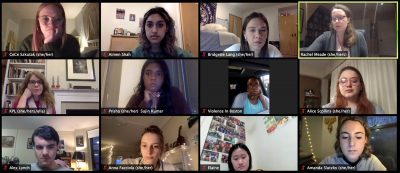
Boston University College Democrats held its annual Spring Panel Thursday night with local activists, who discussed the evolution of protests in the United States and how they define activism.
The featured panelists included faculty members Rachel Meade and Karen Pita Loor, Boston activist Monica Cannon-Grant as well as student activist Prisha Sujin Kumar, a co-founder of the @campus.survivors Instagram page and a junior in the Sargent College of Health and Rehabilitation Sciences.
The panelists answered questions about their relationship with activism and what students can do to promote activist causes in ways outside of in-person protests.
College of Arts and Sciences freshman Alice Scollins, campus coordinator for BUCD, said in an interview the aim of the panel was to examine how activism had changed with time.
“We just wanted to really focus on protests, kind of comparing them over time,” she said, “because right now we’ve seen a spike in protests, especially over the summer with [Black Lives Matter] and continuing on during the past few months.”
Cannon-Grant is the founder and CEO of Violence in Boston — a local organization that aims to highlight disparities in violence around communities of color. She spoke about her experiences in activism and said it “wasn’t a choice” to engage in social activism.
“I’ve encountered police my whole life. I’ve had friends die as early as middle school. I’ve been attending funerals since I was in the eighth grade,” Cannon-Grant said. “I came to this work because I stood next to my son as someone tried to kill him.”
Cannon-Grant cited the amount of work and planning that goes into organizing a protest, which is different for Black activists.
“We have to organize legal observers, we have to organize medics,” Cannon-Grant said, “There’s so much that goes into it when you are a Black activist that I think people take for granted because there’s this notion that because it’s legal … everything is going to be okay.”
Meade, a political science lecturer, has studied populism both in the United States and Argentina as “an observer” and later began working with the Sen. Bernie Sanders, I-Vt., campaign as a canvasser upon returning to the United States. Meade later joined Reclaim Rhode Island, which is a political organizing group.
“Studying these populist groups actually changed me and my own politics,” Meade said.
In the United States, Meade noted, there are indications that there is a restored interest in practical forms of activism.
“I think there are some signs that there is renewed attention to that kind of on the ground, organizational work and the importance of it,” Meade said. “I see it particularly among movements that are led by young people.”
Loor, a clinical associate professor of law and an associate dean for experiential education in the BU School of Law, discussed her past as a public defender in D.C., where she “only ever had one white client.”
Loor said her work provided her direct insight into the legal inequities people of color experience.
“That gave me first-hand experience to see how they were treated,” she said, “how my clients were treated, how brown and Black people were treated in their neighborhoods by police.”
Loor also cited the distinction between how the law was applied to different demographics when it comes to organizing protests.
“Just because something is legal doesn’t mean that there’s not incredible obstacles to obtaining those things,” Loor said. “There’s just so much discretion with police and discretion with courts. So, despite the fact that things are legal, there are obstacles, there are limitations.”
Kumar expressed her thoughts on the power of collective organization — regardless of how many people there are.
“[Protesting] allows people to express dissatisfaction with current situations,” she said, “and as things go on, we can continually use our voice and our abilities as accessible as they are to really send a message, no matter how small of an organized event it is or no matter how big it is.”
Cannon-Grant said protests are not the only means of engaging in activism, and there are other methods that are accessible to people who are unable to protest in-person — such as those who are immunocompromised or have social anxiety.
“I think that the way people protest looks different based on your comfortability,” Cannon-Grant said. “I think that everybody is vital, and we should utilize people in the way that they are able to show up.”
Madhri Yehiya, campus associate editor of The Daily Free Press, is a member of the BU College Democrats Event Board. She was not involved in the editing of this article.























































































































